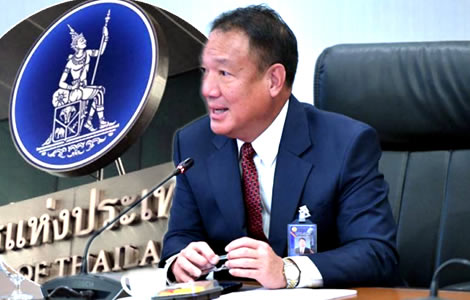Economists and financial experts warn the Thai government: avoid politicising the Bank of Thailand or risk economic fallout. Over 830 signatories, including ex-central bank governors, stress that political interference could lead to a crisis similar to 1997 or an inflation surge.
Academics and financial professionals, including four former central bank governors, are warning the government about the potential politicisation of the Bank of Thailand. A statement signed by 830 professionals as of Saturday has urged caution. The main concern is that political interference could lead to irrational decisions impacting the country’s critical monetary policy environment. In short, this could potentially lead either to a financial crisis similar to 1997 or an inflationary spiral, as seen in economies such as Turkey and Argentina.

A coalition of Thai academics and economic experts is calling on the government to respect the independence of the Bank of Thailand (BoT). The “Economists for Society” group, with over 830 signatories, issued a statement on November 9. Their central message warns that government influence over monetary policy could harm Thailand’s economic stability.
The Pheu Thai-led government plans to appoint a new BoT chairman. This appointment could influence the next BoT governor’s selection in September 2025.
Proposed candidates include Kittiratt Na-Ranong, a former Commerce and Finance Minister, and Pongpanu Sawetarun, a former senior finance official. Both candidates have close ties to the ruling party, raising concerns over the BoT’s autonomy.
The selection committee recently postponed a vote on the appointment until Monday, November 11.
Economists warn against politicising central bank appointments, advocate for a nonpartisan BoT chairman selection process to maintain independence
“Economists for Society” advocates for a candidate without political affiliations. They stress that BoT independence is essential for public trust. Political intervention, they argue, would damage the bank’s credibility and its long-term economic policy-making ability.
BoT independence was formalised in 2008 after the 1997 Asian Financial Crisis. At that time, the International Monetary Fund (IMF) recommended protecting the central bank from political pressures. Under the 2008 law, the BoT governor can only be removed in extreme cases, such as dishonesty or improper conduct.
Despite this, Prime Minister Paetongtarn Shinawatra’s recent comments raised concerns about the BoT’s future. In May, she questioned the need for an independent central bank. She even called the BoT’s independence law an “obstacle” to solving economic issues. This rhetoric has intensified fears that the government may amend the 2008 law. There are also fears that the government could seek direct control of the BoT board.
Concerns rise as Thai government considers amendments to BoT statutory independence, sparking fears of policy instability and irrationality
BoT Governor Sethaput Suthiwartnarueput has followed a cautious approach since 2020. Political leaders advocate for lower interest rates to stimulate growth. However, Sethaput argues that rate cuts do not address Thailand’s structural issues. Excessively low rates, he warns, could harm the economy, especially given rising private debt levels.
Thailand’s projected growth rate this year, between 2.5% and 2.7%, falls below government targets. Key issues—including a declining manufacturing base, poor English proficiency, and inadequate infrastructure—impede long-term growth. Sethaput believes structural reforms, not quick monetary fixes, are needed to address these challenges.
Previously, Sethaput has insisted that structural issues are Thailand’s main economic threat—not high interest rates. The central bank’s focus, he said, is on economic stability.
Uncertainty about the BoT’s future has already impacted Thailand’s financial markets. This year, capital outflows increased as investors grew wary of policy changes. Presently, a similar movement is underway following President-elect Donald Trump’s victory this week.
The Thai baht has weakened. Confidence in Thailand’s stability is shaken by these developments. Outflows from bond and investment markets add to these pressures, fueling economic worries.
Bank of Thailand’s cautious stance faces global economic pressures and capital outflows as investor concerns rise
Foreign economists suggest that Thailand’s growth this year is still remarkable. Many credit the kingdom’s financial stability as a result of the BoT’s prudent policies. The bank’s policies aim to protect the financial system and prepare for emergencies. Given global economic volatility, these safeguards are critical.
In October, the BoT lowered its key interest rate by 25 basis points, surprising markets. Sethaput indicated further cuts this year are unlikely. This cautious stance contrasts with government officials who favour looser monetary policy.
Analysts have pointed to the impact of such policies in Turkey and Argentina. For instance, Turkey recorded a 71.6% rate in June this year, while Argentina is projected to have a 140% rate in 2024.
Meanwhile, the U.S. Federal Reserve has taken a more hawkish stance, raising its rates by 25 basis points this week. This has limited Thailand’s economic options as global pressures build. A larger rate cut was expected. However, Governor Sethaput has insisted that Thailand’s policy will be decided by its own economic criteria.
Central bank’s cautious rate policy diverges from government aims as stability remains its goal
Previously, former Prime Minister Srettha Thavisin accused the BoT of not supporting indebted borrowers and small businesses. In response, he acknowledged the bank’s responsibility to address economic inequities but stressed sustainable policy. The BoT recently ended a pandemic-era loan protection scheme, causing non-performing loans to rise.
According to the National Credit Bureau, true non-performing loans could be as high as 7.5%, far above the reported 3%.
“Economists for Society” insists that political influence would worsen this situation. They warn of a potential crisis like the 1997 financial collapse if the BoT’s independence is compromised. In their statement, they urge the government to prioritise stability over political interests.
Bank of Thailand holding strong against quite a strident push by the PM for more populist economics as debt levels rise
Ung Ing launches attack on the Bank of Thailand questioning the desirability of its independence from government
Finance Minister wants to see higher inflation around 2% to boost GDP growth to over 5% per annum
For over a decade, BoT independence has been a cornerstone of Thai economic policy. Upcoming leadership appointments bring monetary policy autonomy under scrutiny. Thailand’s prospects depend on managing debt responsibly and pursuing structural reforms.
If political influence over the BoT increases, it could set a dangerous precedent. Observers warn that weakening the BoT’s autonomy could have severe consequences. Investor confidence could erode, and inflation could spiral.
The choice of the next BoT chairman will test the government’s commitment to BoT independence.
Join the Thai News forum, follow Thai Examiner on Facebook here
Receive all our stories as they come out on Telegram here
Follow Thai Examiner here
Further reading:
Finance Minister wants to see higher inflation around 2% to boost GDP growth to over 5% per annum
US Federal Reserve rate cut piles pressure on Bank of Thailand and its governor who is holding firm
Central bank holds interest rates. Economy will grow 2.6% in 2024 as Srettha pushes home ownership


















